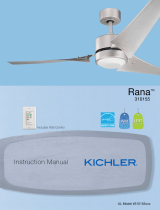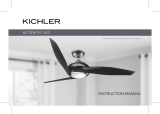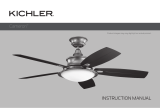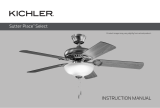Page is loading ...

Product images may vary slightly from actual product.
56” Almere
INSTRUCTION MANUAL
Model# 330130READ AND SAVE THESE INSTRUCTIONS

2 | KICHLER.COM
TABLE OF CONTENTS
ELECTRICAL CONNECTIONS……………………………………………12
INSTALLING THE WALL CONTROL…………………………………14
COMPLETING THE FAN INSTALLATION………………………15
OPERATING INSTRUCTIONS……………………………………………16
FCC INFORMATION……………………………………………………………17
TROUBLESHOOTING………………………………………………………18
SAFETY RULES……………………………………………………………………3
TOOLS REQUIRED………………………………………………………………5
PACKAGE CONTENTS…………………………………………………………5
MOUNTING OPTIONS…………………………………………………………6
ATTACHING THE FAN BLADES…………………………………………7
HANGING THE FAN……………………………………………………………8
INSTALLATION OF SAFETY SUPPORT……………………………11

fan support and may need to be replaced. Due to the
complexity of the installation of this fan, a qualified
licensed electrician is strongly recommended.
6. The outlet box and support structure must be
securely mounted and capable of reliably supporting
a minimum of 15.9 kg (35 pounds). Use only cULus
Listed outlet boxes marked “Acceptable for Fan
Support of 15.9 kg (35 lbs) or less”.
7. The fan must be mounted with a minimum of 2.1 m (7
feet) clearance from the trailing edge of the blades to
the floor.
8. WARNING: Do not operate reversing switch while
fan blades are in motion. Fan must be turned o and
blades stopped before reversing blade direction.
9. Avoid placing objects in the path of the blades.
10. WARNING: make sure the power is disconnected
before cleaning your fan.
56” Almere | 3
READ AND SAVE THESE INSTRUCTIONS
SAFETY RULES
WARNING: FOR CANADA, THIS FAN MUST BE SECURED DIRECTLY TO THE BUILDING STRUCTURE / CEILING JOIST.
DON’T SECURE THIS FAN TO AN OUTLET BOX.
1. CAUTION – RISK OF SHOCK: Disconnect Power at
the main circuit breaker panel or main fusebox before
starting and during the installation.
2. WARNING: All wiring must be in accordance with the
National Electrical Code “ANSI/NFPA 70” and local
electrical codes. Electrical installation should be
performed by a qualified licensed electrician.
3. WARNING: To reduce the risk of electric shock, this
fan must be installed with a general-use, isolating wall
control/switch.
4. WARNING: Not suitable for use with solid-state speed
controls.
5. WARNING: To reduce the risk of fire, electric shock,
or personal injury, mount to outlet box marked
“acceptable for fan support of 15.9 kg (35 lbs.) or
less” and use mounting screws provided with the
outlet box. Most outlet boxes commonly used for
the support of light fixtures are not acceptable for

4 | KICHLER.COM
16. N.W. 7.82 KGS (17.24 LBS) / G.W. 8.75 KGS (19.29 LBS)11. To avoid personal injury or damage to the fan and
other items, be cautious when working around or
cleaning the fan.
12. Do not use water or detergents when cleaning the fan
or fan blades. A dry dust cloth or lightly dampened
cloth will be suitable for most cleaning.
13. After making electrical connections, spliced
conductors should be turned upward and pushed
carefully up into outlet box. The wires should be
spread apart with the grounded conductor and the
equipment-grounding conductor on one side of the
outlet box and the ungrounded conductor on the
other side of the outlet box.
14. Electrical diagrams are reference only. Light kits that
are not packed with the fan must be cULus Listed
and marked suitable for use with the model fan you
are installing. Switches must be cULus General Use
Switches. Refer to the Instructions packaged with the
light kits and switches for proper assembly.
15. All set screws must be checked, and retightened
where necessary, before installation.
SAFETY RULES
WARNING
TO REDUCE THE RISK OF PERSONAL INJURY, DO NOT BEND
THE BLADES DURING ASSEMBLY OR AFTER INSTALLATION.
DO NOT INSERT OBJECTS IN THE PATH OF THE BLADES.

TOOLS AND MATERIALS REQUIRED
PACKAGE CONTENTS
• Phillips Screwdriver
• Blade Screwdriver
• 11 mm Wrench
• Step Ladder
• Wire Cutters
Unpack your fan and check the contents . You should have the following items:
A. Ball/Downrod Assembly
B. Mounting Bracket
C. Canopy
D. Canopy Hole Cover
E. Coupling Cover
F. Motor Assembly
G. Blade (3)
H. Blade Holder
A
B
G
H
C
D
E
I J
F
56” Almere | 5
I. Wall Control Unit
Face plate (1); Wall control (1); Receiver(1);
Wire Connector (4+5);
Long screw (2);
J. Package hardware
1.) Safety cable hardware: Wood screw (1);
Spring washer (1); Flat washer (1)
2.) Mounting hardware: Wire Connector (3);
3.) Blade attachment hardware: Screw (12);
4.) Motor Assembly attachment hardware: Screw (3) x12
x3
x1
x3

6 | KICHLER.COM
Fig. 1
Outlet box
Outlet box
Fig. 2
Fig. 3
Recessed
outlet box ceiling
mounting
plane
Provide strong
support
ANGLED CEILING
MAXIMUM 22° ANGLE
Fig. 4
Outlet box
MOUNTING OPTIONS
If there is not an existing UL (cUL for Canadian Installation) listed
mounting box, then read the following instructions. Disconnect the
power by removing fuses or turning o circuit breakers.
Secure the outlet box directly to the building structure. Use
appropriate fasteners and building materials. The outlet box and its
support must be able to fully support the full weight of the fan (up
to 15.9kg (35 pounds)). Do not use plastic outlet boxes.
Figures 1, 2 and 3 are examples of dierent ways to mount the
outlet box.
NOTE: If you are installing the ceiling fan on a sloped (vaulted)
ceiling, you may need a longer downrod to maintain proper
clearance between the tip of the blade and the ceiling. A minimum
clearance of 12" is suggested for optimal operation.
NOTE: You must use 12" or longer downrod for 22° slope
(max angle 22°). (Fig. 3)
NOTE: Depending on the location you have selected for
installation, you may need to purchase and install a “Joist Hanger”
for the support of the outlet box. Make sure the joist hanger you
purchase has been designed for use with ceiling fans. (Fig. 4)

56” Almere | 7
ATTACHING THE FAN BLADES
CAUTION: To Reduce The Risk Of Electric Shock, Disconnect The
Electrical Supply Circuit To The Fan Before Installing Fan Blades.
Step 1. Align the four holes in a blade with four matching holes in the
blade holder. Thread blade attachment screws into the aligned holes,
and tighten screws to secure the blade to the blade holder. Repeat for
remaining blades. (Fig. 5)
Step 2. NOTE: Inside of the blade holder there are six tabs. Three of the
tabs have a post on top, and three of the tabs have a hole in the center.
NOTE: In the outer ring of the motor assembly there are six holes. Three
of the holes are smaller in size and three of the holes are larger in size.
Carefully insert the motor assembly into the blade holder, aligning the
smaller holes in the motor assembly with the posts on top of the tabs.
Pass the posts through the smaller holes, and seat the outer ring of the
motor assembly on top of all six tabs.
The larger holes in the motor assembly should align with the holes in
the tabs. Thread the three motor assembly attachment screws into the
larger holes in the motor assembly and into the holes in the tabs, and
tighten to secure the motor assembly to the blade holder. (Fig. 6)” Fig. 6
Fig. 5
Blade Holder
Blade Attachment
Screws
Blade
Tab With Hole
Blade Holder
Motor Assembly
Tab With Post
Motor Assembly
Attachment Screws

8 | KICHLER.COM
Fig. 7
Fig. 8
Fig. 9
Outlet Box
Ceiling Mounting
Bracket
Flat Washer
Screw
Set Screw
Hanger Ball
Cross Pin
Clevis Pin
Downrod
Hairpin
HANGING THE FAN
REMEMBER to turn o the power before you begin installation. This is necessary for
your safety and also the proper programming of the control system.
To properly install your ceiling fan, follow the steps below.
Step 1. Before attaching fan to outlet box (not included), ensure the outlet box is securely
fastened to at least two points to a structural ceiling member (a loose box will cause the
fan to wobble). Pass the 120 volt supply wires from the ceiling outlet box through the
center of the ceiling mounting bracket. Install mounting bracket to outlet box in ceiling
using the screws and washers included with the outlet box. (Fig. 7)
Step 2. Remove the hairpin and clevis pin from the downrod assembly, retain for later
use. Remove the hanger ball from the downrod assembly by loosening set screw,
removing the cross pin, and sliding ball o of the rod. (Fig. 8)
NOTE: Make sure to keep loosened hardware separate to avoid confusion during
installation.
Step 3. Loosen the two set screws on the motor coupling. (Fig. 9)
Set Screw
Motor Coupling

56” Almere | 9
Step 4. Carefully feed fan wires and safety cable up through the
downrod. Thread the downrod onto the motor coupling until the clevis
pin holes are aligned. Next, replace the clevis pin and hairpin, then tighten
both set screws. (Fig. 10)
Step 5. Slip the coupling cover, canopy hole cover and canopy onto the
downrod. Carefully reinstall the hanger ball onto the downrod. Make sure
the cross pin is in the correct position and the set screw is tight and the
wires are not twisted . ( Fig. 11)
CAUTION: Ensure all screws are tight before moving to the next step.
HANGING THE FAN (continued)
Motor Coupling
Downrod
Cross Pin
Set Screw
Hairpin Clevis Pin
Set Screw
Fig. 10
Fig.11
Canopy
Hanger Ball
Canopy Hole Cover
Coupling Cover
Downrod

10 | KICHLER.COM
Step 6. Now lift the motor assembly into position and place the hanger
ball into the mounting bracket. Rotate until the “Check Tab” has dropped
into the “Registration Slot “ and seats firmly. ( Fig. 12) The entire motor
body should not rotate if this is done correctly.
WARNING: Failure to properly seat the “Check Tab” can damage the
ceiling fan during operation.
HANGING THE FAN (continued)
Fig. 12
Check Tab
Registration Slot
Mounting Bracket
Hanger Ball

56” Almere | 11
Flat Washer
INSTALLATION OF SAFETY SUPPORT
(required for Canadian installation ONLY)
A safety support cable is provided to help prevent the ceiling fan from faIling, please
install it as follows.
Step 1. Drive a wood screw and washers into the side of the brace that holds the outlet
box. Leave 3mm (1/8") of space between the support brace and the washer. (Fig. 13)
Step 2. Insert the safety cable through the mounting bracket and one of the holes in
the outlet box into the ceiling. Adjust the length of the safety cable to reach the screw
and washers by pulling the extra cable through the cable clamp until the overall length is
correct, put the end of the cable back through the cable clamp, forming a loop at the end
of the cable. Tighten the cable clamp securely. Now, put the loop in the end of the safety
cable over the wood screw and under the washer. Tighten the wood screw securely.
(Fig. 14)
NOTE: Although the safety support cable is required for Canadian installations only,
it’s a good idea to make the attachment with any installation.
Wood Screw
Spring Washer
Outlet Box
Ceiling
Support Brace
Safety Cable Bolt
Wood Screw
Fig. 14
Fig. 13

12 | KICHLER.COM
ELECTRICAL CONNECTIONS
WARNING: To avoid possible electrical shock, be sure you have turned o the power
at the main circuit panel before wiring.
Follow the steps below to connect the fan to your household wiring. Use the wire
connectors supplied with your fan. Secure the connector with electrical tape. Make
sure there are no loose wire stands or connections.
WARNING: If your house wires are dierent colors than referenced in this manual,
stop immediately. A professional electrician is recommended to determine proper
wiring.
Step 1. Insert the receiver into the mounting bracket, with the flat side facing up toward
the ceiling. (Fig. 15)
Step 2. Connect wires using the connectors as shown in WIRE DIAGRAM. (Fig.16)
WARNING: Check to see that all connections are tight, including ground, and that no
bare wire is visible at the wire connections.
Step 3. After the connections have been made, they should be turned upward and
pushed carefully up into the outlet box. The wires should be spread apart with the
grounded conductor (white wires) and the equipment-grounding conductor (green or
bare copper wires) on one side of the outlet box and the ungrounded conductor (black
wires) on the other side of the outlet box.
Fig. 15
Mounting Bracket
Receiver

56” Almere | 13
WIRE DIAGRAM
Fig. 16
AC 120V INPUT
GROUND WIRE
FROM CEILING GROUND WIRE
WHITE (NEUTRAL)
BLACK (MOTOR)
WHITE (“TO MOTOR N”)
BLACK (“TO MOTOR L”)
WHITE (“AC IN N”)
BLACK (“AC IN L”)
RECEIVER
WHITE
BLACK
WALL
CONTROL
BLACK
(“AC IN L”)
BLACK
(“TO MOTOR L”)
GROUND WIRE
BLACK
BLACK

14 | KICHLER.COM
Outlet Box
Outlet Box
Wall Control
Face Plate
Switch
Wall Plate
Fig. 17
Fig. 18
INSTALLING THE WALL CONTROL
WARNING: All wiring must be in accordance with the National Electrical Code and
local electrical codes. Electrical installation should be performed by a qualified
licensed electrician.
NOTE: SWITCH INSTALLATION MUST COMPLY WITH ALL LOCAL AND NATIONAL
ELECTRIC CODE.
WARNING: Shut o main power at the circuit breaker or fuse panel before continuing.
Step 1. Remove the existing wall plate and the old switch from the wall outlet box.
Disconnect wires. (Fig. 17)
Step 2. Connect the outlet box wires to the wall control wires, using the wire connectors
provided. (Fig. 18)
*Connect the lead wire (HOT) from the outlet box to BLACK wire marked
“AC IN L” from wall control.
*Connect the lead wire (LOAD) from the outlet box to BLACK wire marked
“TO MOTOR L” from wall control.
*Connect the GROUND from the outlet box to GROUND from wall control.
Step 3. Secure the wires connectors and make sure there are no loose strands or
connections. Carefully tuck wire connections back inside outlet box and secure the
wall control to outlet box with screws provided. Snap the face plate in place on the front
of the wall control.
GROUND WIRE
FROM CEILING
TO LOAD
TO 120V SOURCE
HOT
BLACK (AC IN L)
BLACK (TO MOTOR L)
GROUND

56” Almere | 15
COMPLETING THE FAN INSTALLATION
Step 1. Remove one of the two shoulder screws in the mounting bracket.
Loosen the second shoulder screw without fully removing it. (Fig. 19)
Step 2. Assemble canopy by rotating key slot in canopy over shoulder
screw in mounting bracket. Reinstall the shoulder screw that was previously
removed, then retighten two shoulder screws securely. (Fig. 20)
Step 3. Securely attach and tighten the canopy hole cover over the shoulder
screws in the mounting bracket utilizing the keyslot twist-lock feature.(Fig.21)
Mounting
Bracket
Shoulder
Screw
Shoulder
Screw
Canopy
Canopy Hole Cover
Fig. 20
Fig. 19
Fig. 21

16 | KICHLER.COM
OPERATING INSTRUCTIONS
ACTIVATING THE LEARNING PROCESS
NOTE: The control system for this fan is equipped with a learning frequency function which has 56K
code combinations to prevent potential interference from other remote units. The frequency on your
receiver and wall control unit has been preset at the factory. No frequency change is necessary. If
the fan is non-functional or if you desire to install another fan within the same area with a separate
frequency code, follow the instructions below.
1.Use a small flat screw driver and gently pry the faceplate apart from the top of wall control. (Fig. 22)
2.After installation is complete, press and hold the LEARN button for 3 seconds within 30 seconds
after AC power is turned on. Fan will turn on at medium speed and light (if installed) will turn on. This
confirms that the SMART SYNC setting is active and OK.
3.If you cannot finish the setting within the 30 seconds time frame, the main power must be turned
o and re-started again. This will repeat step 1 until the LEARN feature is activated as indicated.
LIGHT FUNCTION SELECTION SWITCH (Fig. 22)
D means “Dimmer”
O means “only on/o, no dimmer”
The light of this fan is dimmable, it has been set to “D” position at factory. If you want the light to be
only ON/OFF, slide the switch to “O” position.
NOTE: The “LIGHT FUNCTION SELECTION SWITCH” is N/A for this fan. This fan does not
include a light kit or lamps.
WALL CONTROL OPERATION(Fig. 23)
ON/OFF: Active and lock the wall control
HI : High speed
MED: Medium speed
LOW: Low speed
FAN OFF: Turn o the fan
LIGHT: Turn light ON or OFF. Press and hold the button to set desired brightness.
NOTE: The “LIGHT” button is N/A for this fan. This fan does not include a light kit or lamps.
Fig. 22
Fig. 23
Faceplate
Light function selection switch
LEARN

56” Almere | 17
Fig.25
Fig.24
Fig. 26
REVERSE FUNCTION
To operate the reverse function on this fan, slide the reverse switch
(Fig.24) to the opposite position.
WARNING: Do not operate reversing switch while fan blades are
in motion. Fan must be turned o and blades stopped before
reversing blade direction.
Warm Weather Operation: Warm Weather Operation: Forward (counter clockwise).A downward
airflow creates a cooling eect (Fig.25). This allows you to set your air
conditioner on a warmer setting without aecting your general comfort.
Cool Weather Operation: Cool Weather Operation: Reverse (clockwise). An upward airflow
moves warm air o of the ceiling (Fig. 26). This allows you to set your
heating unit on a cooler setting without aecting your general comfort.
FCC Information
This device complies with part 15 of the FCC Rules. Operation is subject to the following two conditions:
1.)This device may not cause harmful interference, and
2.)This device must accept any interference received, including interference that may cause undesired operation.
Note: Note: This equipment has been tested and found to comply with the limits for a Class B digital device, pursuant to
part 15 of the FCC Rules. These limits are designed to provide reasonable protection against harmful interference in
a residential installation. This equipment generates, uses and can radiate radio frequency energy and, if not installed
and used in accordance with the instructions, may cause harmful interference to radio communications. However,
there is no guarantee that interference will not occur in a particular installation. If this equipment does cause harmful
interference to radio or television reception, which can be determined by turning the equipment o and on, the user
is encouraged to try to correct the interference by one or more of the following measures:
• Reorient or relocate the receiving antenna.
• Increase the separation between the equipment and receiver.
• Connect the equipment into an outlet on a circuit dierent from that to which the receiver is connected.
• Consult the dealer or an experienced radio/TV technician or help.

18 | KICHLER.COM
TROUBLESHOOTING
ProblemProblem
Fan will not start.Fan will not start.
Fan sounds noisy.Fan sounds noisy.
Fan wobble.Fan wobble.
Remote control Remote control
malfunction.malfunction.
SolutionSolution
1. Check circuit fuses or breakers.1. Check circuit fuses or breakers.
2. Check all electrical connections to ensure proper contact.2. Check all electrical connections to ensure proper contact.
CAUTION: Make sure the main power is OFF when checking any electrical connection.CAUTION: Make sure the main power is OFF when checking any electrical connection.
1. Make sure all motor housing screws are snug.1. Make sure all motor housing screws are snug.
2. Make sure the screws that attach the fan blade brackets to the motor are tight.2. Make sure the screws that attach the fan blade brackets to the motor are tight.
3. Make sure wire nut connections are not rubbing against each other or the interior wall of the switch housing. 3. Make sure wire nut connections are not rubbing against each other or the interior wall of the switch housing.
CAUTION: Make sure main power is o.CAUTION: Make sure main power is o.
4. Allow a 24-hour "breaking-in" period. Most noise associated with a new fan disappears during this time.4. Allow a 24-hour "breaking-in" period. Most noise associated with a new fan disappears during this time.
5. If using an optional light kit, make sure the screws securing the glassware are tight. Make sure the light bulbs are not 5. If using an optional light kit, make sure the screws securing the glassware are tight. Make sure the light bulbs are not
touching any other component.touching any other component.
6. Do not connect this fan to a wall mounted variable speed control(s). They are not compatible with ceiling fan motors or 6. Do not connect this fan to a wall mounted variable speed control(s). They are not compatible with ceiling fan motors or
remote controls.remote controls.
7. Make sure the upper canopy has a short distance from the ceiling. It should not touch the ceiling.7. Make sure the upper canopy has a short distance from the ceiling. It should not touch the ceiling.
1. Check that all blade and blade arm screws are secure.1. Check that all blade and blade arm screws are secure.
2. Most fan wobbling problems are caused when blade levels are unequal. Check this level by selecting a point on the 2. Most fan wobbling problems are caused when blade levels are unequal. Check this level by selecting a point on the
ceiling above the tip of one of the blades. Measure this distance. Rotate the fan until the next blade is positioned for ceiling above the tip of one of the blades. Measure this distance. Rotate the fan until the next blade is positioned for
measurement. Repeat for each blade. The distance deviation should be equal within 1/8".measurement. Repeat for each blade. The distance deviation should be equal within 1/8".
3. If the blade wobble is still noticeable, interchanging two adjacent (side by side) blades can redistribute the weight and 3. If the blade wobble is still noticeable, interchanging two adjacent (side by side) blades can redistribute the weight and
possibly result in smoother operation. possibly result in smoother operation.
1.Ceiling Fans with remote control systems CAN NOT be operated in conjunction with any other control system EXCEPT 1.Ceiling Fans with remote control systems CAN NOT be operated in conjunction with any other control system EXCEPT
a basic On/o wall switch, if desired.a basic On/o wall switch, if desired.

KICHLER LIGHTING LLC
30455 SOLON RD.
SOLON, OH 44139 USA
CUSTOMER SERVICE 866.558.5706
8:00 AM TO 5:00 PM EST, MONDAY - FRIDAY
© Kichler Lighting LLC. All Rights Reserved.
REV. 02-10-2023
www.kichler.com

Les images du produit peuvent varier légèrement par rapport au produit réel.
Almere de 56 po
MANUEL D’INSTRUCTIONS
Modèle n° 330130LISEZ ET CONSERVEZ CES INSTRUCTIONS
1/57









